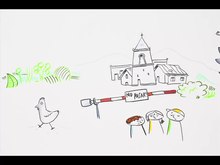Extractivism
As Extractivism (from Lat. Ex trahere "pull"; ex-tractum "the out-drawn") or occupation economy (use of abandoned goods) is defined as the management form of natural landscapes , from which wild plants or animals are taken without the naturally occurring species composition affect negatively. The term is derived from the " extractive economic forms ". This is the name given to the subsistence- oriented maintenance strategies of traditional hunters, gatherers and fishermen .
Extractivism is originally considered a sustainable form of production in third world countries . Above all, traditionally living indigenous peoples manage nature in this way. The chimans in Bolivia, for example, open the trunks of dead trees that they know can be found in honey in order to harvest it. They remove a small part of the honeycomb and then close the hole again, thus ensuring the continued existence of the bee nest. Some nests are often visited in this way to obtain honey.
Often plant species that have not yet been domesticated and therefore not cultivated are used in this way (e.g. Brazil nuts , rubber in South America, many edible mushrooms ).
Use of the term in a broader sense
The terms of extractive business or extractive industry refer to the primary sector of an economic system and thus also to modern economic systems. An extractive economic system describes a system in which the primary production (arable farming, cattle breeding, timber industry, fishing, mining) predominates, which mainly uses soil yields and only processes them to a small extent.
Neo-extractivism
In Chapter IV of his work on the roots of Brazil ( sower and tiler ), Sérgio Buarque de Holanda points out a significant difference between the Spanish and Portuguese colonial expansion in Latin America : While the Spanish, under the influence of the Jesuits, tried to sort their colonies into one To transform civilized and organic extension of the motherland and to exercise systematic control over the entire society also inland (which found its expression in the rectangular city plans of Lima or Mexico City - hence "tiler"), the Portuguese limited themselves to from from the coast to acquire only the wealth attainable without much effort. The metaphor of the “sower” who scatters his seeds in the wind and looks to see if something (and what) comes out of them is appropriate for this style of colonization. Buarque de Holanda thus describes two different styles of extractivism: the planned exploitation of natural resources by the Spaniards (such as in the silver mines of Potosí ) and the rather planned and effortless appropriation of those natural resources that are inexpensively shipped from the coast to the motherland a policy that was not determined by the endeavor to create something permanent, but only by the direct benefit of the merchants and the Portuguese crown.
In the recent economic policy debate the term extractivism is used having significantly negative connotation: it is an on commodity - export and often exploitation reasoned economics, largely without further processing of these resources (so-called neo-extractivism.). This often happens to the detriment of local indigenous communities and biodiversity . This economic form, traditionally attributed to right-wing governments, can be found today in “left” and “right” governed countries. While in Bolivia, for example, Evo Morales stood up to defend the rights of indigenous peoples and small farmers, large-scale extractive projects are now preferred, just as under previous governments. These are seen as an obstacle to industrialization and often also as a source of finance for corrupt power elites.
The negative ecological consequences of large-scale (neo-) extractivism are becoming more and more apparent today.
See also
Web links
Individual evidence
- ^ Walter Hirschberg (founder), Wolfgang Müller (editor): Dictionary of Ethnology. New edition, 2nd edition, Reimer, Berlin 2005. pp. 117–118.
- ↑ François-Xavier Pelletie: Wunderwelten: Bolivia - The trees of the Chimane Indians . TV documentary, France 2005. First broadcast on ARTE on May 1, 2007, 13:05.
- ↑ See e.g. B. Global Entrepreneurship Monitor 2018/2019 , p. 29.
- ↑ Sérgio Buarque de Holanda: The Roots of Brazil. Frankfurt 2013 (original edition: Raízes do Brasil , Rio de Janeiro 1936).
- ↑ Eduardo Gudynas: Neo-Extractivism and Compensation Mechanisms of the Progressive South American Governments. (PDF file; 185 kB) In: Kurswechsel 3/2011, 69–80. Vienna

